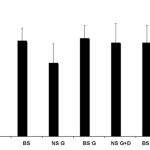
... the first thing he'll do is start [bubbling?] for revenge:
Alas, this is essentially what the new leaders of congress often sound like.
Rarely do I read papers whose title really sums up exactly what is so cool about the study in a succinct way, free of jargon. I think that "First Investigation of the Microbiology of the Deepest Layer of Ocean Crust" does just that. It isn't trying to be sexy... it just is!
Examining the microbial communities in the so-called "deep subsurface biosphere" is a relatively new field. Until recently people didn't think there was much, or really any, life deep in Earth's crust. As with many scientific assumptions made before scientists had the opportunity to actually study a new environment...…
When a paper in Molecular Cell starts with
Science, this very creative human endeavor to understand the nature of the reality that exists independently of ourselves, is impossible. By "impossible," I am not saying "very, very difficult," although it is that, as well.
you just know you're in for a treat.
He lists 6 things to remember when stressed, but I identified most with the first:
Thing #1. You Are Not in Control of the Answers
I contend that this is one of the greatest sources of stress in our professional lives. As scientists, we don't ask for much: we want to have some good ideas (see…
Normally, I would feel woefully unqualified to analyze a Nature Neuroscience paper, but I'm going to do it anyway. How could I pass it up? It features a Toll-like receptor!
Toll-like receptors are typically expressed in immune cells to regulate innate immunity. We found that functional Toll-like receptor 7 (TLR7) was expressed in C-fiber primary sensory neurons and was important for inducing itch (pruritus), but was not necessary for eliciting mechanical, thermal, inflammatory and neuropathic pain in mice.
TLR's are on the front lines of immune defense. They are present on many cells types,…
My house got broken into last week, and then we had a rock thrown through a window a few days later (possibly related). So I had to deal with a bunch of stuff last week, and am still dealing with stuff today, and I need to catch up at work, yada yada yada....
All of which is to say the post I wanted to write about TLR's being involved in itching sensation (me? neuroscience?), might have to be postponed until tomorrow. In the mean-time, I hope you enjoy this song I've been listening to a lot recently.
What sort of music do you listen to to get through stressful/eventful times?
A male fly walks into a bar and orders cornmeal-molasses- yeast. A pretty female fly comes and sits next to him. They look at each other, he starts to say hello, but then she orders some starch. He turns away. She looks at his glass of cornmeal- molasses -yeast and gets up to leave.
A recent study, published in the Proceedings of the National Academy of Sciences, shows that mating preference of fruit flies (the ones you see swarming near a piece of rotten fruit) is dependent on their diet because it changes the composition of bacteria that live in their gut (gut microbiota). This intriguing…
I think understanding the basics of inheritance is pretty easy for most people - the traits of parents are passed down from parents to offspring. Simple! Humans have known and exploited this fact for thousands of years. When Gregor Mendel came along, he meticulously worked out some mathematical rules for inheritance in peas, and we now know that these rules work (more or less) from plants, to ants to elephants, and we know the molecular basis lies in the replication and transmission of DNA.
There's far more nuance than you learn in basic biology, of course. Most visible traits aren't governed…
I have a love/hate relationship with Nature Reviews: Immunology. It comes out once per month, and is usually packed with easy to read articles about fascinating (to me) topics, and each is filled with tons of great references so I can dig into the issue more. On the one hand, I get really excited about all the great things to read and new ways to expand my knowledge. On the other hand - that's a lot of reading. My Instapaper queue is about 80% Nature Reviews (15% other papers, and 5% random crap).
This month is no different, but I decided to have the goal of blogging about the ones that I…
Most biological systems have trade-offs, so this really shouldn't come as a surprise. A recent paper published in Science shows that in sheep, some females have a stronger immune system and tend to live longer, but also tend to reproduce less often. This seemed to translate to roughly equal reproductive fitness over the course of their lives. It's a cool study, clearly involving a lot of work (they took samples over the course of a decade). The New York Times comes soooo close to having a great science article - they just forgot one thing.
They found that the average life span of the 410 ewes…
A few weeks ago, I read an article in Wired talking about an amazing new project led by E.O. Wilson: an all-digital, not-for-profit textbook called Life on Earth. It looks amazing, and it's going to be offered to K-12 schools for free.
Neil Patterson, director of Life on Earth with 50 years of science textbook publishing experience to his name, said the format could revolutionize science education for students.
"Motion and film are powerful ways of teaching," Patterson said. "We're trying to exploit the human brain, like videogames do, and it's not a small matter to use technology now…
I started writing this post before I read ERV dissecting some "the immune system is perfect" BS. Go read hers, then come back if you want more.
Now that I've gone through the basics of a typical immune response, I think it's necessary to point out some of its many flaws. In many of the immunology courses I've taken, the mammalian immune system is presented almost as the pinnacle of evolution, but it is far from perfect. In fact, in many ways, we might be better off if it had never evolved at all.
First up - Autoimmunity. T-cells and B-cells generate random receptors that can in principal see…
[I've been hooked on the immune system since I was a kid and my dad showed me electron micrographs of macrophages eating bacteria in Scientific American. Now that I'm in graduate school studying immunology, and macrophages in particular, my dad asked if I could give a play-by-play of an immune response. Here you go Dad:]
Part 3: Immune memory
Towards the end of the 18th century, Edward Jenner did an experiment. It had long been known that people who had been infected with smallpox, if they managed to survive (no easy feat), would be resistant to further infection. People would even give small…
Viruses are tricky buggers - they force their way into another organism's cell and hijack its machienery to utilize for their own nefarious purposes. This is clearly pretty harmful for the host so there's been pretty strong evolutionary pressure to develop ways to stop them or slow them down (hence the immune system). But in order to do anything, the host first has to recognize that it's infected.
This isn't necessarily as straightforward as it might seem. Viruses (and bacteria and fungus and protists and worms etc) are living things, and use the same molecular building blocks, and many of…
[This post was originally published at webeasties.wordpress.com]
I was trained as an Environmental Scientist long before I was at all interested in Microbes. So, I get excited when I come across microbial studies that are environmentally relevant. I get particularly nerd-cited when these studies take place in the ocean. A paper published in PNAS last month describes identifies what may be the key environmental factor distinguishing the evolution of microbial populations in the North Atlantic and North Pacific sub-tropical gyres.
The finding that populations of the abundant, widespread, and…
If you're in the Boston area, come see me (and two other awesome grad students) give a talk on microbes, especially the ones that live in you and on you.
We've got everything from fecal transplants to whether bacteria can make you fat or not. Come out to Armenise amphitheater at the Harvard Medical School at 7pm, you won't regret it!
A lot has been said, written, and discussed about the recent Oil Spill in the Gulf of Mexico. The spill has been capped but the damage remains. The Gulf of Mexico has now become the feedstock of several battles, fierce and feeble, in the legal, political and scientific realm. What battles you say? It's what on your mind as well - What will happen of the Gulf of Mexico? What do we need to do to save the physical, chemical and biological environment? And the worst of all - Is the damage irreversible?
Sadly, we don't have any answers yet. And let's face it - there is no right answer. What we do…
A while back, ERV had a post about the tenuous link between Vitamin D and all sorts of effects on health (and I shamelessly co-opted her title). Then, PalMD dissected the spurious link between Broccoli and cancer. Now it's my turn:
A new study has revealed that naturally occurring chemicals found in the skin of the nut boost the immune system's response to such infections.
Researchers found almond skins improved the ability of the white blood cells to detect viruses while also increasing the body's ability to prevent viruses from replicating and so spreading inside the body.
Oh Guardian, I…
[I've been hooked on the immune system since I was a kid and my dad showed me electron micrographs of macrophages eating bacteria in Scientific American. Now that I'm in graduate school studying immunology, and macrophages in particular, my dad asked if I could give a play-by-play of an immune response. Here you go Dad:]
Part 2: T-cells, B-cells and adaptive immunity
If you've ever had the flu (and I mean for real influenza, not some sissy man-flu), you know how much it sucks. But don't blame the virus. Many of the most unpleasant symptoms - extreme fatigue, snot-filled sinuses, and high…
Hi ScienceBlogs... it is GREAT to be here!
I just spent the weekend with many of the scientists whose research has comprised the bulk of my reading material (ie brain-biggering) over the last 1.5 years... yikes! I also got to meet many other young scientists hoping to make a career out of this crazy science game. It was totally awesome, and quite a whirlwind.
I was at the 2010 Ridge2000 community meeting in Portland, OR. It was a meeting of about 140 people united by their shared interested in better understanding what goes on at mid-ocean ridges. We represented disciplines ranging from…
We beasties came together through our love of microbes, but also through a graduate student group called Science in the News. SITN is completely run by graduate students, and our mission (much like the mission of this blog) is to share our love of science with the general public. We have a lot of events to this end, from school out-reach to a monthly newsletter to Science Cafes (called "Science by the pint" - we basically get drunk and talk science with whoever happens to be in the bar). But our main event is a lecture series every fall.
And it just so happens that this week, I'll be…

